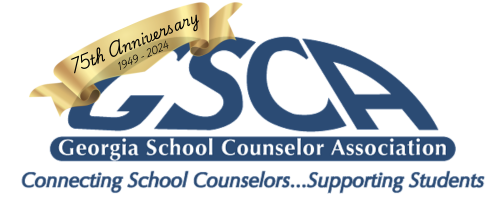Strategic Plan
MISSION
The Georgia School Counselor Association represents, promotes, and enhances professional school counseling in Georgia to create improved outcomes for all students.
BIG AUDACIOUS GOAL
GSCA is essential in improving student academic, career and social/emotional development
SHARED VALUES
Integrity, Stewardship/Accountability, Collaboration, Dedication, Transparency, and Professionalism
VIVID DESCRIPTIONS OF THE FUTURE
- As GSCA implements its strategic plan and achieves its big audacious goal, it will create a future in which school counselors are funded appropriately, and Georgia’s ratio level is at or below the national recommendation. This will result in an elevated respect for the profession, and the news media will see GSCA members as the leading experts in the profession. School counselors will be asked by school administrators to be engaged in strategic conversations related to all student issues, and they will value their perspective. Furthermore, school leadership will value counselors in such a way that they are no longer asked to perform non-counseling duties as part of their job, which will result in increased time spent with students.
- As an organization, GSCA will be recognized as a national leader, and the association’s professional development programs will set the industry standard. This will translate into growth in membership and increased value for members and for the profession as a whole.
- GSCA will continue to foster a culture of leadership development.
- Students will be positively affected. All Georgia schools will have a comprehensive school counseling program. This will support an increase in graduation rates and a decrease in drop-out rates. Standardized test scores will increase above the national standard. Georgia students will achieve higher post-secondary entrance and completion rates.
- Students and their families will have increased support and accessibility for mental health services.
GOALS
By achieving the following goals, GSCA will begin to experience its envisioned future and move closer to accomplishing its big audacious goal (bold indicates a 2019-2020 priority).
GOAL AREA #1 – ENGAGEMENT
- Develop a plan for engaging members through a multi-generational lens (new objective added July 2019)
- Create a membership engagement plan (created 2017-2018, implementation began 2018-2019), which may include
- Incentive and recognition program to encourage volunteerism both with governance and knowledge sharing (speaking, writing, etc.)
- Graduate student specific areas for engagement
- Board hosted town hall meetings
- Survey members for needs and renewal
- Marketing campaign (promotional materials, and recognition for longevity and county growth
- Referral incentives
- Text messaging alerts
GOAL AREA #2 – ADVOCACY
- Articulate the desired outcome with regard to student mental health and discuss how best to accomplish this outcome (added July 2018)
- Operational items to consider in tandem:
- i.e. Explore development of a bill comparable to the Baker Act (FL)
- i.e. How to create inter-agency cooperation/relationship building (keep APEX Grant in mind)
- i.e. Development of guidance materials, such as counselors’ role in support of students with mental health concerns
- i.e. APEX Grant
- (moved from Professional Development area)
- Operational items to consider in tandem:
- Work towards getting the CKES tool adopted by the DOE as the tool by which counselors are evaluated (added July 2018)
- Day at the capitol (completed 2018-2019 and continuing 2019-2020)
GOAL AREA #3 – GOVERNANCE
- Develop a mechanism to ensure continued program and operational momentum beyond an individual’s term of service
- Identify an ongoing mechanism for identifying, cultivating, and ensuring accountability of GSCA volunteers and leaders
- Develop communications plan and key messaging for the proposed new mission statement (complete d2017-2018)
GOAL AREA #4 - PROFESSIONAL DEVELOPMENT
- Identify how we can lead an effort for shifting the mindset statewide in a compassionately educational way toward understanding the need for a comprehensive model. This includes not just school counselors but other key stakeholders (e.g. central office, Principals, parents). Note: In discussion consider whether we can also leverage the strategic objective related to engaging our multi-generational membership.
- Operational items to consider in tandem:
- Develop and provide advocacy tools for school counselors
- Operational items to consider in tandem:
- Develop a process to partner with government and non-government organizations to allow school counselors access to existing education and support (PD programs), which may include:
- Promoting DOE, ASCA, SACAC, etc. resources and programs
- Who to do it? How? How to ensure it continues to happen with changes in leadership? How do we identify the partners? etc.
- Curate a list of PD resources for our members
- (added July 2018)
- Industry/college tours at conference
- Webinars
- Establish learning tracks for conference
- Youth mental health first aid training (conference and regional meetings)
- Develop mechanism to highlight programs to partners, such as mental health
- Develop a mechanism to partner with business and industry for education and support (2017-2018 priority), which may include:
- Collaboration with TCSG
- Inclusion of career and post-secondary liaison
- More exposure of CCR access programs and alternatives
- Credentialing and incentives
- Develop a rural counselor workshop focused on training, which may include comprehensive model, advocacy tools, etc.
- Develop a training program for administrators on the comprehensive school counseling model and mechanism for ongoing collaboration
- Develop support groups to help build knowledge and capacity (key: strong, knowledgeable facilitators)
